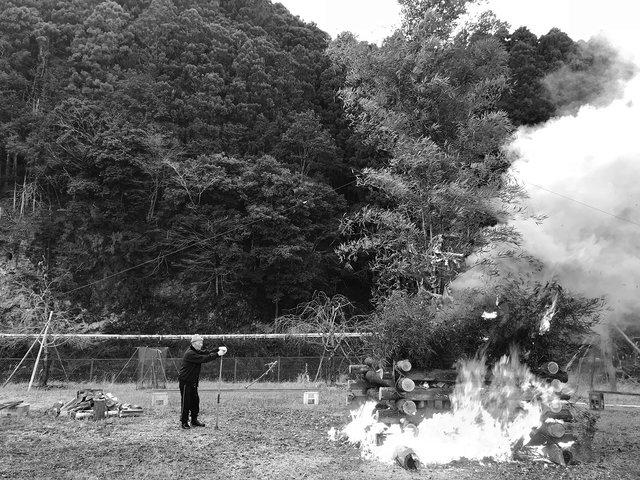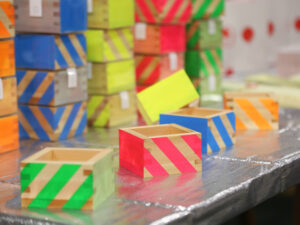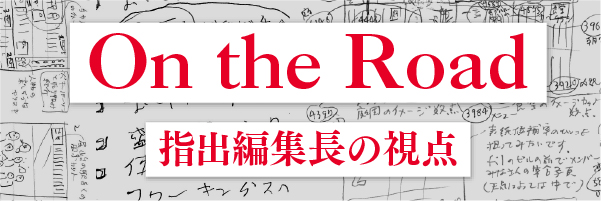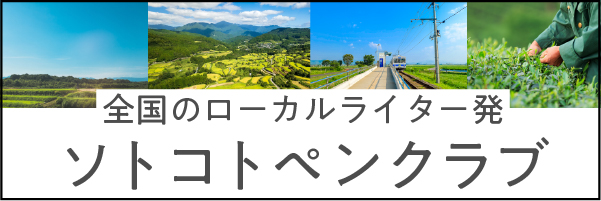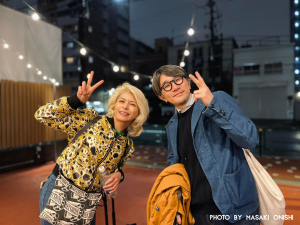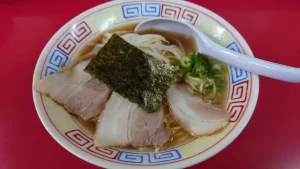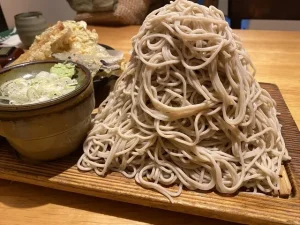午前11時のチャイムが上多古区内で鳴った時、みんなはもう広いグラウンドで集まっていた。グラウンドの真ん中に数メートルの丸太が四角の形で数段まで組み上がった。四角の中に長い竹が垂直に立てられ、上多古の上空で左右に揺らされた。人は梯子を上り、家の注連縄をできるだけ高く竹に付けた。グラウンドの周辺から「にいちゃん、中に入れたろうか!」とからかった声がみんなをくすくす笑わせた。もっとも年上のおじいさんたちは丸太の四角までゆっくり歩き、丸太に火を点け、上多古のどんど焼きを開始した。
今年は雪が積もっていなかったが、相変わらず寒かった。火が丸太から竹に移り、時々ポンとはじけるような音をさせながら、周りの空気を暖かくした。みんなはお神酒を竹のコップでいただいた。お姉さんたちはお肉を鉄網の上にどんどん載せ、手際よくトングで裏返し、人に配った。「焼けとる、焼けとる!エリックちゃんも呼ばれや」と隣のおばさんはお肉を何枚も紙皿に運んでいた。缶ビールも早速渡された。うまく歩けない年上の方のことを忘れずに、「ぜんざいができたら、お兄さんに入れたってや」とおじさんは大きな声で言った。長い板と瓶ビールカゴで作られたベンチに座りながら、僕と近所のおばさんたちは定番の豚汁をすすり、温もった。
どんど焼きの火が燃え続き、優しいパチパチの音を出した。CDプレーヤーから「悲しい酒」のストリングとギターのメロディが流れ、おばさんたちはマイクを囲みながら歌った。最後に、おにぎりとよもぎ餅が鉄網の上に載せられた。その中に、何個もの茶色い餅もあった。「あー、栃餅ーー!」と僕は興奮を抑えられずに言った。川上村に来て、初めて食べた栃餅がすぐ僕の好物になった。栃餅を作るには手間がかかるらしいけど、僕はいつも興味があった。「栃餅の作り方を教えてくれる人はいますか」と僕はみんなに問いかけた。「隣のおばちゃんが一番上手に作れるから、今度聞いてみ!」と一人は言い、みんなが「うん、うん」と賛成していた。栃餅がおいしそうな焼け色に変わった。僕は1個を噛んだ。やわらかくて、甘かった。
最後に残った少人数は丸太を調整しながら、どんど焼きの火を保った。火が小さくなっても、缶ビールがまた渡された。風が強くなり、火がだんだん弱くなり、また冬の寒さを感じた。余った豚汁をもらい、翌日の朝食にした。僕はこの日に着た服を2回洗濯しても、煙の匂いがなかなか消えなかった。それはしょうがないことというより、なんだか嬉しいことだった。
Vol.9 The Soft and Sweet Ones
When the 11 a.m. chime rang in the Kodako district, everyone had already gathered at the wide dirt grounds. In the middle of the grounds, logs meters in length were assembled into a multi-level square. Long stalks of bamboo stood upright in the square and were swayed left and right by the Kodako upper air. One person climbed a ladder and attached his house’s shimenawa as high as possible to the bamboo. From the outskirts of the grounds, “Hey brother, want me to throw you in there?” teased a voice, making everyone giggle. The oldest men walked slowly to the log square, lit the logs on fire, and commenced the dondoyaki of Kodako.
There was no snow on the ground this year, but it was cold as usual. The fire moved from the logs to the bamboo, sometimes giving off a loud boom while warming the air around us. Everyone drank their sacred saké from a bamboo cup. The older sisters threw slice after slice of meat onto the grill, deftly flipping and serving them with tongs. “It’s cooked, it’s cooked! Eric, eat up,” the woman next to me said as she shoveled numerous slices onto my paper plate. I was also quickly handed a can of beer. Without forgetting about an older person who could not walk very well, one man shouted out, “When the zenzai is ready, make sure big brother gets some.” While sitting on a bench made of a wooden plank and beer crates, some neighborhood women and I sipped the staple pork miso soup and warmed up.
The dondoyaki fire continued to burn, giving off a nice crackle. The string and guitar melody of “Sad Saké” played from a CD player, and women surrounded a microphone and sang with it. Finally, rice balls and mugwort mochi were loaded onto the barbecue. Among them, there were numerous brown mochi as well. “Ahh, tochi mochi!” I said, unable to control my excitement. Eating it for the first time when I came to Kawakami Village, this horse chestnut mochi quickly became one of my favorites. It is apparently a hassle to make, but I had always been interested. “Is there anyone here who can teach me how to make horse chestnut mochi? ” I asked everyone. “The woman next to you is the best, so just ask her! ” one woman said, and everyone agreed with a “Right, right”. The horse chestnut mochi changed to a delicious looking color. I took a bite of one. It was soft and sweet.
The few people left rearranged the logs and preserved the dondoyaki fire. Even after the fire grew was smaller, I was handed another can of beer. The wind grew heavier, the fire weaker, and we once again felt the coldness of winter. I received some leftover pork miso soup, and made it my breakfast the next day. Even after twice laundering the clothes I wore that day, the smell of smoke would not go away. Rather than something that cannot be helped, it was something that I was somehow happy about.




